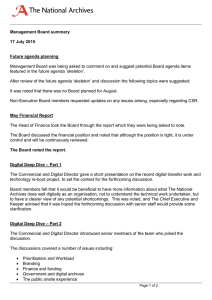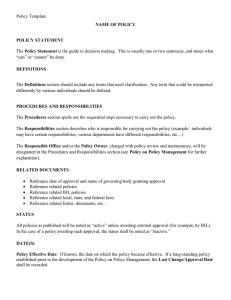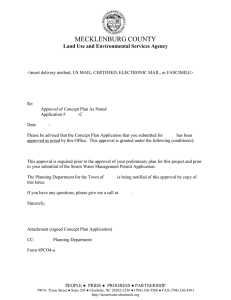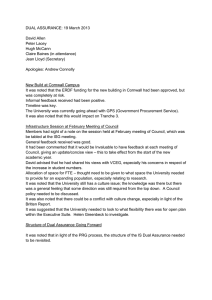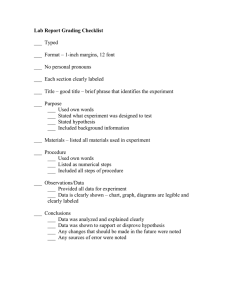MEMORANDUM FOR THE RECORD Event: James Grant
advertisement
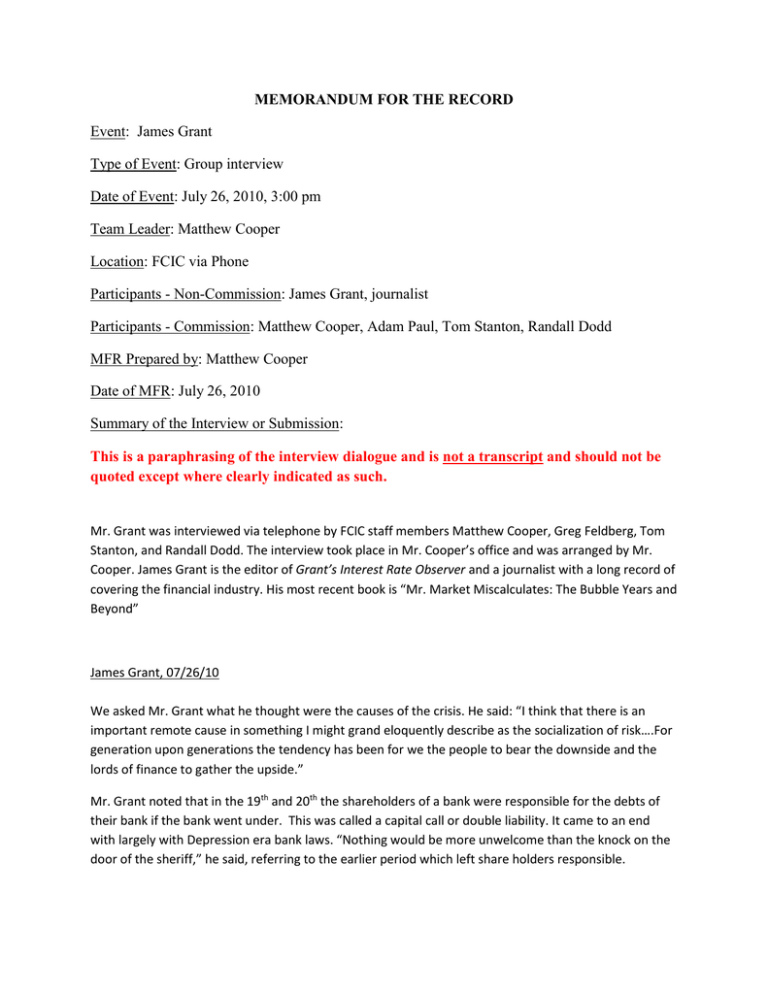
MEMORANDUM FOR THE RECORD Event: James Grant Type of Event: Group interview Date of Event: July 26, 2010, 3:00 pm Team Leader: Matthew Cooper Location: FCIC via Phone Participants - Non-Commission: James Grant, journalist Participants - Commission: Matthew Cooper, Adam Paul, Tom Stanton, Randall Dodd MFR Prepared by: Matthew Cooper Date of MFR: July 26, 2010 Summary of the Interview or Submission: This is a paraphrasing of the interview dialogue and is not a transcript and should not be quoted except where clearly indicated as such. Mr. Grant was interviewed via telephone by FCIC staff members Matthew Cooper, Greg Feldberg, Tom Stanton, and Randall Dodd. The interview took place in Mr. Cooper’s office and was arranged by Mr. Cooper. James Grant is the editor of Grant’s Interest Rate Observer and a journalist with a long record of covering the financial industry. His most recent book is “Mr. Market Miscalculates: The Bubble Years and Beyond” James Grant, 07/26/10 We asked Mr. Grant what he thought were the causes of the crisis. He said: “I think that there is an important remote cause in something I might grand eloquently describe as the socialization of risk….For generation upon generations the tendency has been for we the people to bear the downside and the lords of finance to gather the upside.” Mr. Grant noted that in the 19th and 20th the shareholders of a bank were responsible for the debts of their bank if the bank went under. This was called a capital call or double liability. It came to an end with largely with Depression era bank laws. “Nothing would be more unwelcome than the knock on the door of the sheriff,” he said, referring to the earlier period which left share holders responsible. It was called a double liability rule, Mr. Grant said, noting that shareholders and bank heads would not only lose their stake in the bank if it went under but would acquire its debts as well. Mr. Grant added that “then along came deposit insurance and from 1935…to the early 1950s it came to be that the FDIC supplanted individuals and their position with regards to their bank investments.” He noted though that most investment firms were general partnerships and not publicly traded corporations that gave executives limited liability. “In the day, broker dealers on Wall Street were general partners and GPs were at risk for everything they owned,” Mr. Grant told the FCIC. “The structure of general partnership didn’t guarantee general solvency…and many of these broker dealers went by the wayside….[But] the people who run these institutions were more and more insulated from the consequences of their own actions….You would never have seen Bear Stearns or Morgan Stanley showing up in marketplace in the aughts and leveraged 40 to 1 if the top brass were at risk for their homes and their Picassos as well as their options and their equity.” The migration from individual responsibility to collective responsibility was dangerous, Mr. Grant said. Grant noted that when Lehman was a partnership and partners met in the company’s old dining room in its old Williams Street headquarters, each of the partners was mindful of risk, there was “inherent attention to risk management.” Today, Mr. Grant said, that fear needs to be inculcated in corporate banking culture. He quoted an old Wall Street hand approvingly who noted that his greatest accomplishment had been to inculcate “the fear of God.” This, Mr. Grant said, was missing from today’s culture. The FCIC asked Mr. Grant if the Federal Reserve was to blame for the crisis for keeping interest rates low. Mr. Grant said he thought this was a major cause of the crisis. He said that “there is some Fed generated confusion at the bottom of the interest rate question and that is whole issue of deflation.” Grant pointed to speeches in 2005 by Bernanke and Greenspan “warning against the perils of broadly falling prices …These speeches seemed to omit any mention that falling prices might not be such a bad thing after all.” “In fact prices fell broadly and persistently for the last quarter of the 19th century,” Mr. Grant observed, “a time of great technological innovation and geographical expansion of the world’s production.” Prices would naturally fall because of technological improvement and the world’s growing labor force in the first decade of the 21st century. It “arguably shifted the world’s demand curve downward and to the right.” Lower prices were nothing to fear and should have been expected. “The conduct of the Fed during these years strikes me as mystifying….Things were better not weak or perilous.” By warning about it deflation the Fed leaders precipitated the crisis. Grant added: “By trying to forestall imagined deflation they precipitated actual deflation.” On the question of complex financial instruments, Grant said they might be “considered a symptom of the crisis. One might consider it a cause.” He noted that “The crisis was one of abuse of pricing or debt in almost all of its forms. Everyone was in on it and everyone was making money.” When asked about early warnings, Grant observed that those who give early warnings tend to be ignored and tend to have been wrong before. “That is the nature of the skeptical observer,” he said. Grant noted that in Brazil bank executives are liable for bank losses. “There is no system that saves human beings from the weakness of the flesh…but I think we’ve...evolved…with the worst system possible,” Grant said. “Never before have we had the following There’s a central bank with no anchor and no limit on what it can do…That’s new since 1971...[there’s] no anchor on Wall Street—a salutary fear of personal ruin....And there is the Fed's increasing intrusiveness and micromanagement of finance…They are out giving speeches, steering the economy…It seems to me that the purpose of the cycle is to instill a fear of the downside. He also said that “central bankers cite the regret moderation and preen themselves on their dexterous management. But consider the unintended consequence of that, leverage unimagined and unseen.” Drivers of massive leverage were, he said, “willful ignorance of the nature of securities that rewarded triple A but were anything but. Also there was willful ignorance of history and of cycles.” He called this t “the drinking of Fed-brewed Kool Aid.” Grant offered to send up papers that explained the ‘double liability” that kept bank shareholders accountable for a bank’s losses. It was in place from the Civil War until the Depression and remained the case in a few states until the 1950s. It went away with the Banking Act of 1935. On the GSEs, he called their work “worse than scandalous.” He noted that the Fed is in a difficult position holding large numbers of mortgages while Fannie and Freddie are under conservatorship. He added: “Not the least of the ironies is that the Federal Reserve’s solvency is being affected by the GSEs.” I think it’s disingenuous to say that CDOs were unanalyzable, as Fed Chairman Greenspan once noted. Grant agreed that too big to fail was a problem and pointed us towards a book on Citibank’s evolution. He noted that Citi was founded in 1812 and Brown Brothers in 1818. He noted that Brown Brothers which remained a limited partnership came through this much better than Citi which is a financial giant. Mr. Grant said he would think of areas where the FCIC might best use its investigative powers. 4849-4549-8887, v. 1
